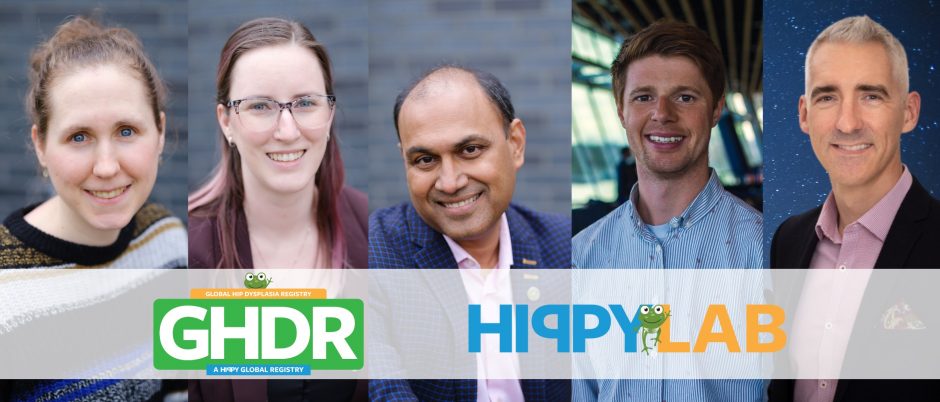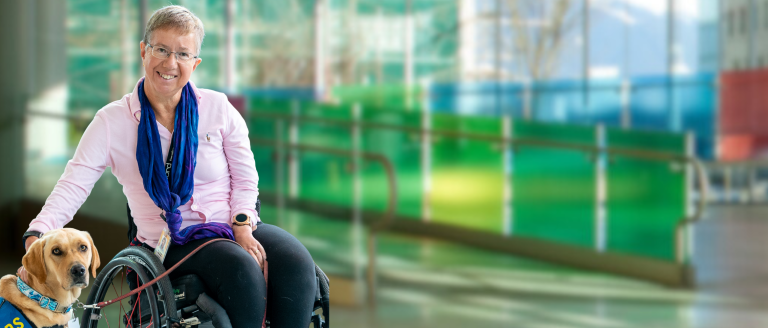By Jolie Leung

We are proud to announce that Drs. Kishore Mulpuri (PI), Emily Schaeffer, Bryn Zomar and Simon Kelley, as well as Jeffrey Bone, were successful in their Canadian Institutes of Health Research funding application. $1,086,298 was granted for their clinical investigation project “Comparing observation vs. bracing in radiologically dysplastic, stable hips in infants with developmental dysplasia of the hip. An International Multi-Centre Non-Inferiority Randomized Control Trial”.
Developmental dysplasia of the hip (DDH) occurs in 1-3% of all newborns, and may range from mild to severe, with complete hip dislocation. When detected early, nonsurgical treatment with hip bracing to keep the child’s hips in the proper position is most commonly used. Despite the high success rate of this treatment, it can still disrupt maternal bonding time, present challenges to family life such as diaper changes and car seat safety, and cause stress for parents. The bracing treatment itself also poses a financial barrier, especially for uninsured patient families. This study will be the first to examine whether observation is inferior to brace treatment for babies under three months of age with mild DDH.
Annually, CIHR dispenses approximately $1B in support of health research. In the 2021-22 fiscal year, funding for project and foundation grants accounted for roughly half of CIHR Grants and Awards expenditures. The funding for this project will subsidize the cost of bracing, making it easier for other centres around the world to collaborate. In addition, participating centres will be remunerated for their participation.
In conversation, UBC Post-Doctoral Fellow Dr. Zomar shared that this study is based on the infrastructure of the Global Hip Dysplasia Registry (GHDR), which currently has over 5,500 patients. Drs. Mulpuri and Schaeffer established the Registry in 2016, and built it for the purpose of supporting hypothesis-led studies, such as this one.
International centres in the United Kingdom, Australia, India, United States, and New Zealand will be participating, while a centre in the Netherlands will compare their data collected in a similar study, but examining an older age group. Hypothesizing that no significant difference will be found between observation and bracing, the study hopes to eliminate the burdens and associated costs of bracing for parents, preventing potentially unnecessary treatment. Dr. Zomar also noted that the burden of breastfeeding and bonding difficulties, and stress for parents could be assuaged if observation is found to be no worse than bracing.
Learn more about the grant and study HERE.
Dr. Kishore Mulpuri, Primary Investigator, is the Head of the UBC Department of Orthopaedics and a Paediatric Orthopaedic Surgeon at BC Children’s Hospital. Dr. Emily Schaeffer is the Research Director for Pediatric Orthopaedics at BC Children’s Hospital and a Research Associate with the UBC Department of Orthopaedics. Dr. Bryn Zomar is a Post-Doctoral Fellow at BC Children’s Hospital’s Hippy Lab. Dr. Simon Kelley is the Associate Chief of Perioperative Services at SickKids Hospital and a Paediatric Orthopaedic Surgeon, and a long-time collaborator with GHDR. Jeffrey Bone is the Biostatistical Lead at the BC Children’s Hospital Research Institute.
The co-applicants are joined by collaborators Drs. Alexander Aarvold, Alaric Aroojis, David Bade, Pablo Castañeda, Emily Dodwell, Leo Donnan, Jose Herrera-Soto, Nikki Hooper, Harry Kim, Nina Mathijssen, Wudbhav Sankar, Salil Upasani, Nicole Williams, and Adhiambo Witlox.
The I’m a HIPpy Foundation has been a long-time partner of the Hippy Lab, and has helped support GHDR, along with the Pediatric Orthopaedic Society of North America (POSNA), the Canadian Orthopaedic Association (COA), BC Children’s Hospital Foundation, Divi’s Foundation for Gifted Children, and the Peterson Fund for Global Hip Health.


